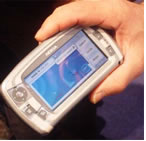 The BBC needs to move fast to create suitable partnerships to be able to ride the new wave of ‘TV on the go’. That’s my conclusion after attending a recent IIC event last week (that’s the International Institute Of Communications to you). There I can reveal I was drawn into what felt very much like a mobile content ‘love fest’.
The BBC needs to move fast to create suitable partnerships to be able to ride the new wave of ‘TV on the go’. That’s my conclusion after attending a recent IIC event last week (that’s the International Institute Of Communications to you). There I can reveal I was drawn into what felt very much like a mobile content ‘love fest’.
Representatives from a diverse group of media industries including MTV and BT were prophesizing mobile TV is the saviour of TV. Trials in Europe have indicated that across the continent viewers can’t get enough of TV on a tiny little display on their phones and this isn’t just the ‘bite sized’ mobile episodes that commentators had been predicting. It appears that mobile TV is able to actually increase the number of hours that viewers consume, which many thought had peaked.
With this new form of TV, it is said ‘you no longer need to be a couch potato, you can be a potato anywhere’ so expect many hours of work to be lost to must watch TV phenomena like ‘I’m a celebrity’ and ‘Big Brother’.
Channel 4 New Media has recently announced the launch of a mobile TV channel dedicated to Channel 4 content on mobile phones. Sky is planning a 19 channel launch in conjunction with Vodaphone and an ITV mobile service has been announced.
The mobile manufactures need to provide the right interface with an easy to navigate EPG and the content needs to be held securely on the device it’s downloaded to minimise the potential for sharing.
All the big players have a keen interest in the success, from the handset makers, the telcos and of course, the content owners who will expect to negotiate a premium for their programming. The players are going to have to effectively perform a ‘land-grab’ to make sure that an ‘ipod’ like solution does not steal their planned-for bonanza.
Where though does a Public Service Broadcaster fit into this increasingly monetized market? The BBC has been looking at DAB technology providing ultra local TV, but this is unlikely to the drive young affluent consumers who are the usual early adopters of new gizmos.
We are consistantly drawn back to the same conclusion with Mobile TV. This content may be offered; handset makers can produce the equipment; consumers may dabble with it if it costs them nothing.
The still unanswered question is, will the consumer put their collective hands in their collective pockets to pay for it?
 Much has been made of what have been reported as poor results at BskyB (Profits announced on Friday 4 Nov 05 saw a pre-tax rise of 13.6% to £200m), intense competition is given as the cause of the lower than hoped for growth in subscribers.
Much has been made of what have been reported as poor results at BskyB (Profits announced on Friday 4 Nov 05 saw a pre-tax rise of 13.6% to £200m), intense competition is given as the cause of the lower than hoped for growth in subscribers.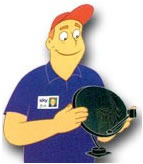 Most would consider a UK satellite rival needs to be positioned to use the same satellites as Sky services that’s Eurobird and Astra 2. If you move away from their orbital positions, you’re going to have to duplicate a whole load of services across two platforms with the expense that will entail.
Most would consider a UK satellite rival needs to be positioned to use the same satellites as Sky services that’s Eurobird and Astra 2. If you move away from their orbital positions, you’re going to have to duplicate a whole load of services across two platforms with the expense that will entail. The other group that would be interested are the ‘churn’ which are now reported by Sky as around 11%. These are subscribers who are leaving their Bskyb packages – but they’re really already on the Sky Freesat as unless someone comes and takes away their Set- top-box and mini-dish. They’ll get many of the FTA (Free To Air) services like ITV3 that aren’t available on analogue terrestrial and, for a small charge, can obtain a viewing card that will allow them to view those encrypted services like Channel 5, Channel 4, ITV1 and ITV2.
The other group that would be interested are the ‘churn’ which are now reported by Sky as around 11%. These are subscribers who are leaving their Bskyb packages – but they’re really already on the Sky Freesat as unless someone comes and takes away their Set- top-box and mini-dish. They’ll get many of the FTA (Free To Air) services like ITV3 that aren’t available on analogue terrestrial and, for a small charge, can obtain a viewing card that will allow them to view those encrypted services like Channel 5, Channel 4, ITV1 and ITV2. Exclusive animated footage from Gorillaz Demon Days Live in Manchester will be available ‘on demand’ via the red button on digital television for seven days, courtesy of BBC Radio 1.
Exclusive animated footage from Gorillaz Demon Days Live in Manchester will be available ‘on demand’ via the red button on digital television for seven days, courtesy of BBC Radio 1. Dan Duncombe, Digital Media Manager at Parlophone, comments, “Giving fans the ability to access content across a number of digital platforms is a key part of the Manchester events. These shows are groundbreaking and working with Radio 1 has allowed us to take this further in terms of reach as well as interactivity. Gorillaz fans throughout the world can access and interact with this exclusive audio and visual content, making it a truly global and multi platform event.”
Dan Duncombe, Digital Media Manager at Parlophone, comments, “Giving fans the ability to access content across a number of digital platforms is a key part of the Manchester events. These shows are groundbreaking and working with Radio 1 has allowed us to take this further in terms of reach as well as interactivity. Gorillaz fans throughout the world can access and interact with this exclusive audio and visual content, making it a truly global and multi platform event.” Despite so much current talk from the UK Telco’s and Sky on the magic that will provide an on demand broadcast TV proposition in the UK, tangible evidence of a working model beyond KiT in Hull and Homechoice is pretty sparse.
Despite so much current talk from the UK Telco’s and Sky on the magic that will provide an on demand broadcast TV proposition in the UK, tangible evidence of a working model beyond KiT in Hull and Homechoice is pretty sparse.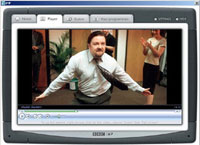 Despite the somewhat limited selection of programmes, which I’m told is largely down to copyright issues, it seems a positive move for a public sector broadcaster actually providing a service and solving the ‘problem’ of letting you see a programme you forgot to record or you later discover is worth viewing.
Despite the somewhat limited selection of programmes, which I’m told is largely down to copyright issues, it seems a positive move for a public sector broadcaster actually providing a service and solving the ‘problem’ of letting you see a programme you forgot to record or you later discover is worth viewing.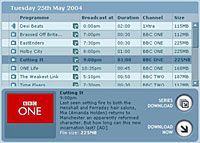 The BBC is thinking beyond the present Windows-only solution. Speaking recently in London the BBC’s Project Director for iMP Ben Lavender reinforced the BBC philosophy of platform agnosticism and spoke of the desire to work on Apple and Linux solutions when DRM issues can be satisfactorily dealt with.
The BBC is thinking beyond the present Windows-only solution. Speaking recently in London the BBC’s Project Director for iMP Ben Lavender reinforced the BBC philosophy of platform agnosticism and spoke of the desire to work on Apple and Linux solutions when DRM issues can be satisfactorily dealt with.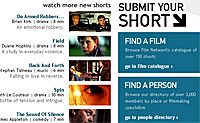 Not satisfied with its already-almighty online presence, the BBC has launched the Film Network – a growing interactive showcase for new British filmmakers, broadcasting three new short films in broadband quality every week.
Not satisfied with its already-almighty online presence, the BBC has launched the Film Network – a growing interactive showcase for new British filmmakers, broadcasting three new short films in broadband quality every week.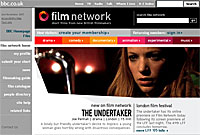 The Website aims to expose new talent and create a platform for some great films that are rarely seen elsewhere.
The Website aims to expose new talent and create a platform for some great films that are rarely seen elsewhere. Viewers keen to grab a slice of the free film action will first have to register on the site.
Viewers keen to grab a slice of the free film action will first have to register on the site.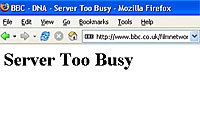 It should be noted that the BBC Film Network is not part of the currently in-trials
It should be noted that the BBC Film Network is not part of the currently in-trials 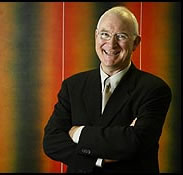 However, he did manage to mention a couple of issues which aren’t directly about himself. For example, he said the following in regard to EPG’s, searching and the gateways to information – this is already a fundamental issue for regulators and one where we all need to pay close attention as to how they look to regulate…
However, he did manage to mention a couple of issues which aren’t directly about himself. For example, he said the following in regard to EPG’s, searching and the gateways to information – this is already a fundamental issue for regulators and one where we all need to pay close attention as to how they look to regulate…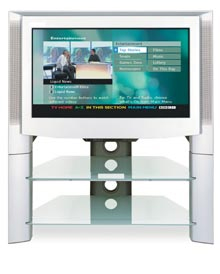 A couple of stories have been circulating about the BBC of late, both concerning their adoption of digital TV.
A couple of stories have been circulating about the BBC of late, both concerning their adoption of digital TV.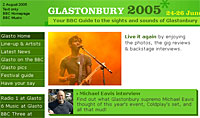 The BBC’s online coverage of Live 8 in July notched up a record volume of Web traffic on their radio and music Websites.
The BBC’s online coverage of Live 8 in July notched up a record volume of Web traffic on their radio and music Websites.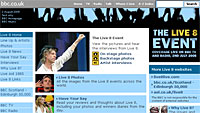 The latest figures for the BBC’s online traffic also show a healthy boost in figures for their sports coverage on the Radio Five Live Website, with 910,841 unique users being recorded during June, compared with 840,019 the same period in 2004.
The latest figures for the BBC’s online traffic also show a healthy boost in figures for their sports coverage on the Radio Five Live Website, with 910,841 unique users being recorded during June, compared with 840,019 the same period in 2004.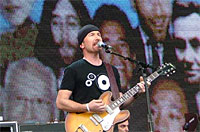 It was mainly good news elsewhere, with Radio 1, Radio 2, Radio 3, Radio 4, 1Xtra, Asian Network and BBC 7 all increasing their unique users compared to the same period last year, with only 6 Music – one of our favourites – letting the side down with a disappointing slump from 418,729 to 356,564.
It was mainly good news elsewhere, with Radio 1, Radio 2, Radio 3, Radio 4, 1Xtra, Asian Network and BBC 7 all increasing their unique users compared to the same period last year, with only 6 Music – one of our favourites – letting the side down with a disappointing slump from 418,729 to 356,564. Punters are being invited to get all interactive with the BBC’s TV and radio schedules as part of their Backstage experiment. The call to action was trumpted at the London hosted Open Tech grass roots conference that ran at the weekend.
Punters are being invited to get all interactive with the BBC’s TV and radio schedules as part of their Backstage experiment. The call to action was trumpted at the London hosted Open Tech grass roots conference that ran at the weekend. The BBC has already received more than 50 prototype ideas for using BBC feeds and content for non-commercial purposes since the project’s launch in May.
The BBC has already received more than 50 prototype ideas for using BBC feeds and content for non-commercial purposes since the project’s launch in May. Two users of the same online bulletin board were in the same carriage of a London Tube train that was involved with the blast last week.
Two users of the same online bulletin board were in the same carriage of a London Tube train that was involved with the blast last week. Without the discussion boards on urban75 or the Internet, the likelihood of two people caught up in the explosions meeting again, is highly unlikely.
Without the discussion boards on urban75 or the Internet, the likelihood of two people caught up in the explosions meeting again, is highly unlikely.